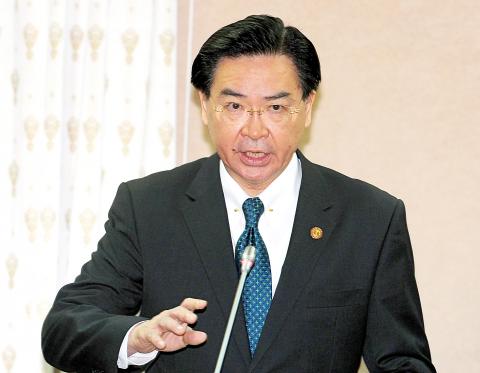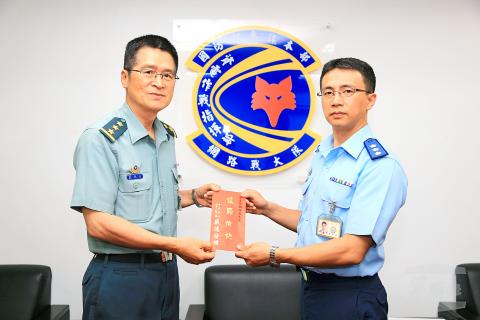President Tsai Ing-wen (蔡英文) has named National Security Council (NSC) Secretary-General Joseph Wu (吳釗燮) to be the Presidential Office secretary-general, the Presidential Office announced yesterday.
Council adviser Yen Teh-fa (嚴德發), a retired army general and former chief of the General Staff from 2015 to last year, was named as Wu’s successor as head of the council.
Wu and Yen are scheduled to assume their new posts next week, Presidential Office spokesman Alex Huang (黃重諺) said.

Photo: CNA
Wu is replacing Lin Bih-jaw (林碧炤), who resigned on Oct. 20 last year to focus on his writing.
Huang said Wu is an experienced hand at cross-strait affairs who has successfully led the council through the transition period and effectively navigated the international relations challenges that arose from the changing political situation in the region.
During the administration of former president Chen Shui-bian (陳水扁), Wu served as chairman of the Mainland Affairs Council and as the nation’s representative to Washington. He later served as Democratic Progressive Party secretary-general and the party’s representative to Washington, before being appointed to the council last year.

Photo: courtesy of the Military News Agency
Tsai has praised Wu’s professionalism and calm performance, Huang said.
Yen established a broad professional portfolio during his four decades of military service, with a successful track record in bolstering the military’s emergency response capabilities and raising the reputation of the armed forces, Huang said.
Yen was appointed to the council’s top post because his professional abilities would be relied upon to assist the government in devising national defense and homeland security policies, Huang said.

CHAOS: Iranians took to the streets playing celebratory music after reports of Khamenei’s death on Saturday, while mourners also gathered in Tehran yesterday Iranian Supreme Leader Ayatollah Ali Khamenei was killed in a major attack on Iran launched by Israel and the US, throwing the future of the Islamic republic into doubt and raising the risk of regional instability. Iranian state television and the state-run IRNA news agency announced the 86-year-old’s death early yesterday. US President Donald Trump said it gave Iranians their “greatest chance” to “take back” their country. The announcements came after a joint US and Israeli aerial bombardment that targeted Iranian military and governmental sites. Trump said the “heavy and pinpoint bombing” would continue through the week or as long

TRUST: The KMT said it respected the US’ timing and considerations, and hoped it would continue to honor its commitments to helping Taiwan bolster its defenses and deterrence US President Donald Trump is delaying a multibillion-dollar arms sale to Taiwan to ensure his visit to Beijing is successful, a New York Times report said. The weapons sales package has stalled in the US Department of State, the report said, citing US officials it did not identify. The White House has told agencies not to push forward ahead of Trump’s meeting with Chinese President Xi Jinping (習近平), it said. The two last month held a phone call to discuss trade and geopolitical flashpoints ahead of the summit. Xi raised the Taiwan issue and urged the US to handle arms sales to

State-run CPC Corp, Taiwan (CPC, 台灣中油) yesterday said that it had confirmed on Saturday night with its liquefied natural gas (LNG) and crude oil suppliers that shipments are proceeding as scheduled and that domestic supplies remain unaffected. The CPC yesterday announced the gasoline and diesel prices will rise by NT$0.2 and NT$0.4 per liter, respectively, starting Monday, citing Middle East tensions and blizzards in the eastern United States. CPC also iterated it has been reducing the proportion of crude oil imports from the Middle East and diversifying its supply sources in the past few years in response to geopolitical risks, expanding

Pro-democracy media tycoon Jimmy Lai’s (黎智英) fraud conviction and prison sentence were yesterday overturned by a Hong Kong court, in a surprise legal decision that comes soon after Lai was jailed for 20 years on a separate national security charge. Judges Jeremy Poon (潘兆初), Anthea Pang (彭寶琴) and Derek Pang (彭偉昌) said in the judgement that they allowed the appeal from Lai, and another defendant in the case, to proceed, as a lower court judge had “erred.” “The Court of Appeal gave them leave to appeal against their conviction, allowed their appeals, quashed the convictions and set aside the sentences,” the judges